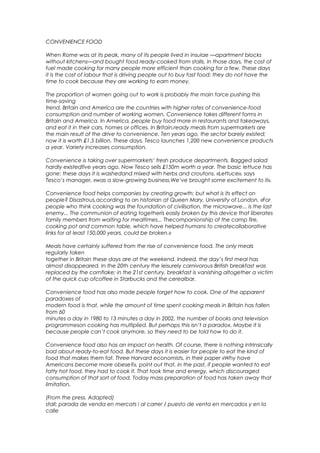
Convenience food
- 1. CONVENIENCE FOOD When Rome was at its peak, many of its people lived in insulae —apartment blocks without kitchens—and bought food ready-cooked from stalls. In those days, the cost of fuel made cooking for many people more efficient than cooking for a few. These days it is the cost of labour that is driving people out to buy fast food: they do not have the time to cook because they are working to earn money. The proportion of women going out to work is probably the main force pushing this time-saving trend. Britain and America are the countries with higher rates of convenience-food consumption and number of working women. Convenience takes different forms in Britain and America. In America, people buy food more in restaurants and takeaways, and eat it in their cars, homes or offices. In Britain,ready meals from supermarkets are the main result of the drive to convenience. Ten years ago, the sector barely existed; now it is worth £1.5 billion. These days, Tesco launches 1,200 new convenience products a year. Variety increases consumption. Convenience is taking over supermarkets’ fresh produce departments. Bagged salad hardly existedfive years ago. Now Tesco sells £150m worth a year. The basic lettuce has gone: these days it is washedand mixed with herbs and croutons. «Lettuce», says Tesco’s manager, «was a slow-growing business.We’ve brought some excitement to it». Convenience food helps companies by creating growth; but what is its effect on people? Disastrous,according to an historian at Queen Mary, University of London. «For people who think cooking was the foundation of civilisation, the microwave... is the last enemy... The communion of eating togetheris easily broken by this device that liberates family members from waiting for mealtimes... Thecompanionship of the camp fire, cooking pot and common table, which have helped humans to createcollaborative links for at least 150,000 years, could be broken.» Meals have certainly suffered from the rise of convenience food. The only meals regularly taken together in Britain these days are at the weekend. Indeed, the day’s first meal has almost disappeared. In the 20th century the leisurely carnivorous British breakfast was replaced by the cornflake; in the 21st century, breakfast is vanishing altogether a victim of the quick cup ofcoffee in Starbucks and the cerealbar. Convenience food has also made people forget how to cook. One of the apparent paradoxes of modern food is that, while the amount of time spent cooking meals in Britain has fallen from 60 minutes a day in 1980 to 13 minutes a day in 2002, the number of books and television programmeson cooking has multiplied. But perhaps this isn’t a paradox. Maybe it is because people can’t cook anymore, so they need to be told how to do it. Convenience food also has an impact on health. Of course, there is nothing intrinsically bad about ready-to-eat food. But these days it is easier for people to eat the kind of food that makes them fat. Three Harvard economists, in their paper «Why have Americans become more obese?», point out that, in the past, if people wanted to eat fatty hot food, they had to cook it. That took time and energy, which discouraged consumption of that sort of food. Today mass preparation of food has taken away that limitation. (From the press. Adapted) stall: parada de venda en mercats i al carrer / puesto de venta en mercados y en la calle
- 2. Tesco: una de les principals cadenes d’hipermercats de la Gran Bretanya / una de las principales cadenas de hipermercados de Gran Bretaña launch: llançar (un producte) al mercat / lanzar (un producto) al mercado leisurely: tranquil, pausat / tranquilo, pausado Starbucks: cadena americana de cafeteries / cadena americana de cafeterías
